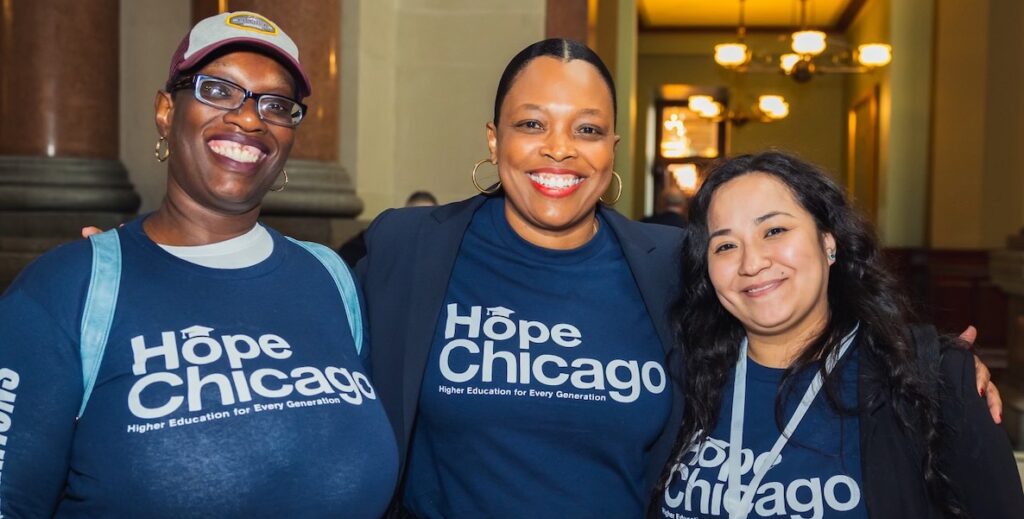About 20 years ago, when I led Arizona State University West, I convinced generous donors to provide combined scholarships for young student-parents, along with their preschoolers, who we enrolled in the campus’s state-of-the-art Family Development Center. These scholarships allowed both the college students and their little ones to attend school for free. Higher education is a family matter, as we can see from the communal joy at this month’s college graduations.
After reading a Chicago Tribune story on Mother’s Day about Hope Chicago, I now wish I had had the foresight to expand my idea of multigenerational education. As The Tribune reports, the three-year-old program funds college tuition, living expenses and a stipend for any high school graduate of five Chicago public high schools — and it provides the opportunity for one parent or guardian of each student to also receive a scholarship to pursue a degree or certification from an institution of higher education.
So far, some 1,200 students have received scholarships from Hope Chicago, which is dedicated to “debt-free postsecondary pathways for Chicago students and parents,” according to its website. The scholarships are paid for with the support of national and local corporations including Aldi, Monroe Capital, Walgreens, and Wintrust. According to Hope Chicago CEO and former Chicago Superintendent of Schools Janice Jackson, “The model is the largest effort in the country to provide multigenerational scholarships.”
Status quo-changing family scholarships
Hope Chicago is a 501C3 dedicated to higher education as a way to change the status quo for families in five underserved Chicago neighborhoods. Prior to Hope Chicago, an average of 57 percent of graduates from the five Hope Chicago partner high schools enrolled in college. After the first year, that number jumped to 74 percent. In addition to significant financial benefits, Hope Chicago offers mentoring for students and their families.
One example Hope Chicago touts: Malachi and his dad, Lee. As a high-achieving and hard-working student at Morgan Park High School in Chicago’s far South Side, Malachi feared that the high cost of college would prevent his enrollment. In February 2022, he found out about Hope Chicago. Now a freshman at Southern Illinois University at Carbondale, he is studying psychology with possible plans to become a therapist. But his freedom from economic burdens allows him to keep his options open and to follow his driving curiosity — something that more privileged students have long been able to do.
Meanwhile, also thanks to Hope Chicago, Lee is working on his degree in computer science at Washington College, part of the City Colleges of Chicago system. He says, “I’m looking forward to completing my degree, having confidence in my success, and to providing a better life for Malachi and his younger brother.”
Is there hope for Philadelphia?
Innumerable Philadelphia families would benefit from a local version of the Hope Scholarship Program. In 2018, the National Student Clearinghouse Center (NSCRC), reported 1,033,612 Pennsylvanians as SCND (some college but no degree) — a state of limbo that often leaves people saddled with debt, but without the commensurate salary to pay it off. As the NSCRC continues to collect data, it would be no surprise to see that number rising substantially. We know that many parents who never finished degrees are still paying off their own student loans just as their teenage offspring are preparing to enter college and incur their own indebtedness.
A multigenerational Philadelphia Hope scholarship program could help to erase the education — and subsequent wage — gap for residents of color. Reporting on Pew’s 2024 State of the City, WHYY noted, “Black and Brown workers come from resource-deficient families and are less likely to obtain an associate degree or higher than their white counterparts.” That has real financial consequences: Data shows that Americans with bachelor’s degrees earn between 55 percent and 86 percent more than those whose education ended with a high school diploma.
What’s more, according to The Tribune, “A study by the Urban Institute found that mothers in the United States who returned to school and completed a degree earn on average three times more and have better mental health than their counterparts who did not return to school.”
Call to action
Creating family-based Hope scholarships here takes vision, planning and cooperation. I call upon Mayor Parker, the School District of Philadelphia, local foundations, and universities to work together to steal and implement this life-changing and city-changing idea. Please begin those conversations before Father’s Day on June 16.
Correction: A previous version of this post misstated the source of information about the 2024 State of the City.
Elaine Maimon, Ph.D., is an Advisor at the American Council on Education. She is the author of Leading Academic Change: Vision, Strategy, Transformation. Her long career in higher education has encompassed top executive positions at public universities as well as distinction as a scholar in rhetoric/composition. Her co-authored book, Writing In The Arts and Sciences, has been designated as a landmark text. She is a Distinguished Fellow of the Association for Writing Across the Curriculum. Follow @epmaimon on X.

